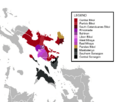Bikol languages facts for kids
Bikol is a language spoken by people in the Bicol Region in the southeastern part of Luzon, an island in the Philippines. The Spanish language greatly influenced Bikol.
The Bikol languages are actually a group of languages. They are spoken mostly on the Bicol Peninsula of Luzon. You can also hear them in parts of Catanduanes and Burias Islands, and in Masbate province. These languages are related to the Visayan languages. Together, they are sometimes called the Bisacol languages.
Central Bikol, also known as Bicol-Legaspi or Bicol-Naga, is the most common language in the Bicol region. It is spoken in many areas, including northern and western Camarines Sur, eastern Albay, and northeastern Sorsogon. People who speak Central Bikol can be found in all the provinces in Bicol. It is the main language in Camarines Sur. The standard way of speaking Central Bikol comes from the Canaman dialect.
Contents
How Bikol Sounds
Bikol has its own unique sounds, similar to English but with some differences.
Vowels
Bikol has sounds like 'a' as in "father", 'e' as in "bed", 'i' as in "week", 'o' as in "open", and 'u' as in "book".
Consonants
Many Bikol consonants sound like English ones. For example, 'b' as in "bed", 'd' as in "dog", 'g' as in "goat", 'h' as in "house", 'l' as in "lizard", 'm' as in "milk", 'n' as in "new", 'p' as in "pine", 'r' as in "rice", 's' as in "sweet", 't' as in "two", 'w' as in "weight", and 'y' as in "you".
Special Sounds
Bikol also has some sounds that might be new to you:
- A sound like 'ng' as in "song".
- Some words have a special stop sound, like the break in "uh-oh".
Common Diphthongs
Diphthongs are two vowel sounds that blend together. In Bikol, you might hear sounds like:
- 'aw' as in "wow"
- 'ay' as in "buy"
- 'oy' as in "boy"
Comparing Things
When you want to compare things in Bikol, you can use words like:
- mas dakula: This means "bigger".
- pareho dakula: This means "the same big size".
Saying "The Biggest"
To say something is the biggest or most intense, Bikol uses:
- pinakadakula: This means "the biggest".
- Adding -un or -on to an adjective makes it more intense. For example, dakulaon means "relatively bigger" compared to something else.
Images for kids
-
Geographic distribution of major Bikol languages and dialects across Bicol Region. Masbatenyo, Central Sorsogon, and Southern Sorsogon are Bisayan languages but heavily influenced by Bikol.
See also
 In Spanish: Lenguas bicolanas para niños
In Spanish: Lenguas bicolanas para niños
 | Victor J. Glover |
 | Yvonne Cagle |
 | Jeanette Epps |
 | Bernard A. Harris Jr. |


